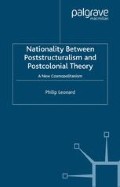Abstract
When Terry Eagleton, in a review of Gayatri Chakravorty Spivak’s A Critique of Postcolonial Reason, declares that Spivak’s ‘flamboyant theoretical avant-gardism conceals a rather modest political agenda’1 he rehearses the allegation, made repeatedly since the late 1970s, that poststructuralism indulges in a ludicism that prevents it from offering a compelling critique of the social, the political, and the cultural. Poststructuralist theory, Eagleton tells us, is caught up in a ‘selftheatricalizing’2 introspection; its notion of resistance permits little more than a vigilant complicity with dominant institutions, and its theory of cultural power fails to provide a convincing analysis of social systems and the injustices embedded within them. These claims tellingly reiterate other work — by other critics, as well as Eagleton — that excoriates poststructuralist theory for being unsystematic, ahistorical, rarified, abstruse, or banal; for being, in other words, a diversion from properly effective forms of radical critique.
Access this chapter
Tax calculation will be finalised at checkout
Purchases are for personal use only
Preview
Unable to display preview. Download preview PDF.
Notes
Terry Eagleton, ‘In the Gaudy Supermarket’ London Review of Books, 21: 10 (1999), 6.
Benita Parry, ‘Problems in Current Theories of Colonial Discourse’, Oxford Literary Review, 9: 1–2 (1987), 27–58; Aijaz Ahmad, In Theory: Classes, Nations, Literatures (London: Verso, 1992); Arif Dirlik, The Postcolonial Aura: Third World Criticism in the Age of Global Capitalism (Boulder: Westview Press, 1992); Bart Moore-Gilbert, ‘Spivak and Bhabha’, in Henry Schwarz & Sangeeta Ray, (eds), A Companion to Postcolonial Studies (Oxford: Blackwell, 2000), pp. 451–66.
James Clifford, ‘Taking Identity Politics Seriously: “The Contradictory Stony Ground…”’, in Paul Gilroy, Lawrence Grossberg & Angela McRobbie (eds), Without Guarantees: In Honour of Stuart Hall (London: Verso, 2000), p. 99.
Friedrich Nietzsche, Beyond Good and Evil: Prelude to a Philosophy of the Future, trans. Marion Faber (Oxford: Oxford University Press, 1998), pp. 143–5.
Friedrich Nietzsche, Twilight of the Idols/The Anti-Christ, trans. R.J. Hollingdale (London: Penguin, 1990), p. 112.
Friedrich Nietzsche, ‘Philosophy in the Tragic Age of the Greeks’, trans. M.A. Mugge, in Geoffrey Clive (ed.), The Philosophy of Nietzsche (New York: Mentor, 1965), p. 154
Alan D. Schrift, ‘Nietzsche’s Contest: Nietzsche and the Culture Wars’, in Alan D. Schrift (ed.), Why Nietzsche Still? Reflections on Drama, Culture, and Politics (Berkeley: University of California Press, 2000), p. 193.
Edmund Husserl, ‘Philosophy and the Crisis of European Man’, in Phenomenology and the Crisis ofPhilosophy, trans. Quentin Lauer (New York: Harper Torchbooks, 1965), p. 155.
Martin Heidegger, ‘The Origin of the Work of Art’, in Poetry, Language, Thought, trans. Albert Hofstadter (London: Harper & Row, 1971), p. 39.
Leslie Paul Thiele, Timely Meditations: Martin Heidegger and Postmodern Politics (Princeton: Princeton University Press, 1995), pp. 148–9.
Jacques Derrida, Of Grammatology, trans. Gayatri Chakravorty Spivak (Baltimore: The Johns Hopkins University Press, 1976), p. 102.
Robert J.C. Young, ‘Race and Language in the Two Saussures’, in Peter Osborne and Stella Sandford (eds), Philosophies of Race and Ethnicity (London: Continuum, 2002), p. 78.
Emmanuel Levinas, Totality and Infinity: An Essay on Exteriority, trans. Alphonso Lingis (Pittsburgh: Duquesne University Press, 1969), p. 281.
Homi K. Bhabha, ‘Editor’s Introduction: Minority Maneuvers and Unsettled Negotiations’, Critical Inquiry 23: 3 (1997), pp. 438–9.
Emmanuel Levinas, Difficult Freedom: Essays on Judaism, trans. Sean Hand (London: Athlone, 1990), p. 164.
For a further discussion of Levinas’s treatment of nationality, of the status of Israel in his work, and the relationship between his ‘philosophical’ and ‘confessional’ writings, see Philip Leonard, ‘A Supreme Heteronomy?: Arche and Topology in Difficult Freedom’ in Sean Hand (ed.), Facing the Other: Ethics in the Work of Emmanuel Levinas (Richmond: Curzon, 1996), pp. 121–39.
Roger Scruton, England: An Elegy (London: Pimlico, 2001), pp. 16–17.
Jurgen Habermas, The Postnational Constellation: Political Essays, trans. Max Pensky (London: Polity, 2001), p. 64.
Copyright information
© 2005 Philip Leonard
About this chapter
Cite this chapter
Leonard, P. (2005). Cosmopolitan Locations. In: Nationality Between Poststructuralism and Postcolonial Theory. Palgrave Macmillan, London. https://doi.org/10.1057/9780230503854_1
Download citation
DOI: https://doi.org/10.1057/9780230503854_1
Publisher Name: Palgrave Macmillan, London
Print ISBN: 978-1-349-51445-8
Online ISBN: 978-0-230-50385-4
eBook Packages: Palgrave Literature & Performing Arts CollectionLiterature, Cultural and Media Studies (R0)

